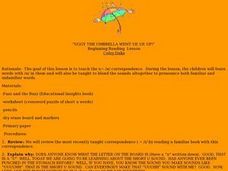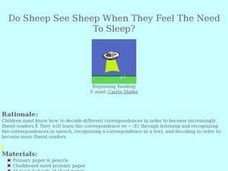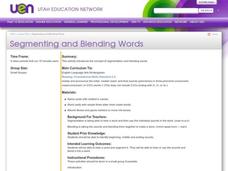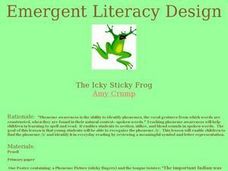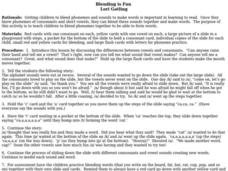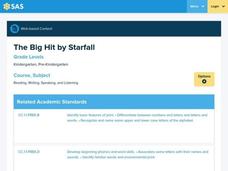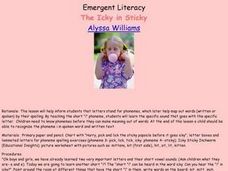Curated OER
Under the Umbrella
Learners explore the short /u/ sound. They practice making the sound, noticing how their mouths move to make it. They use letterboxes to spell 'u' words, identify 'u' = /u/ in written words, and play the 'Under the Umbrella' game.
Curated OER
The Doctor Said Open Up and Say /o/
Students complete a variety of activities related to the short /o/ sound. As a class they recite a tongue twister, and trace and write the letter O. Students then listen to the book "In the Big Top," and write down the words from the...
Curated OER
Uggy the Umbrella Went Up, Up, Up!
Young scholars explore the short /u/ sound. They practice making the sound, noticing how their mouths move to make the sound. They recite tongue twisters with short /u/ words and practice writing the letter 'u'. With a partner, they...
Curated OER
Do Sheep See Sheep When They Feel The Need To Sleep?
First graders distinguish between the sounds for short vowel e and long vowel e. They are introduced to the vowel patterns that comprise long vowel sounds, with a particular emphasis on /ee/. They practice reading and identifying a...
Curated OER
Doctor : Open Wide And Say /o/
Students complete a variety of activities related to the short /o/ sound. As a class they recite a tongue twister, then trace and write the letter O. Students listen to a list of words and identify the words containing the short /o/...
Curated OER
Segmenting and Blending Words
Students are introduced to the concept of segmentation and blending of words. As a class, they are shown various words and are asked to determine the amount of letters and sounds in each. To end the lesson, they participate in a...
Curated OER
On-Level Small Group Phonics Lesson: ea /e/
Students explore /e/. In this phonics lesson, students decode words with "ea" representing the short e sound. Students read sentences and a short book that includes "ea" word practice.
Curated OER
Segmenting and Blending Words
Students listen to words, then segment them into sounds, and hear sounds and blend them into words.
Curated OER
The Icky Sticky Frog
Learners practice the strategy of phoneme awareness in order to identify phonemes with vocal gestures in spoken words. They blend letters and sounds together utilizing the phoneme /i/ by symbol and letter representation and listen as the...
Curated OER
Short E Word Practice
In this short e word practice worksheet, students will cut and glue final letters to make short e words that begin with m, b, p, j, l , and w.
Curated OER
Short E Name the Picture
In this short e name the picture worksheet, students will choose a short e word from the word bank to correctly name the picture. Then students will draw a picture of a pet hen.
Curated OER
Short O Name the Picture
In this short o name the picture worksheet, students will choose a short O word from the word bank to correctly name the picture. Then students will draw a picture of hot dogs.
Curated OER
Learn-to-Read Pumpkin Patch
Learners practice identifying and pronouncing the short letter "u" sound. For this phonetic awareness lesson, students access the Starfall.com website and follow the directions on the screen to reinforce the short "u" sound. Learners can...
Curated OER
Rain Rain Go Away
Complete a variety of activities related to the long /a/ sound with a focus on words containing the ai and ay correspondence with your readers. As a class, they recite a tongue twister, then spell different words containing ay and ai...
Curated OER
Applying Phonetic Principles
Young readers develop their phonetic skills by using a nifty tool called a word pocket. They use the tool to help them organize individual letters that they have at their desks to spell entire words and to construct beginning and ending...
Curated OER
Blending is Fun
Use a poster picture of a slide to illustrate the blending of phonemes in words. First show your youngsters basic examples like cat and cap. Then have learners work in pairs to create some blends of their own! Provide words for them to...
Curated OER
Grabbing For Vowels
Students explore the short /a/ sound. Taking turns, they pick short /a/ sight word apples from a bulletin board apple tree. Each student reads the word and then chooses someone from the class to identify the /a/ sound in the word.
Curated OER
Olly Olly Oxenfree
Students review short vowel sounds. They complete a variety of activities as they discover how to say the short /o/ sound, write the letter 'o', and pronounce words with the short /o/ sound. They read stories with short /o/ words in them.
Curated OER
The Big Hit
Students are introduced to the phonetic sound associated with the short letter "i" and listen to a story which includes words with this sound. For this the big hit starfall lesson, students build sound letter accuracy. Students also...
Curated OER
Aaa-aaa-aaa-choo!!
Students study the /a/ sound by mimicking the sound one makes when they sneeze. Next they work with a tongue twister, which they recite while stretching out the initial short a sound. Next, they practice writing the letter and read "A...
Curated OER
The Icky in Sticky
Students study the /i/ sound by listening to it in words and a tongue twister which they later recite. Next, they practice writing the letter and making word using letterboxes. They listen to 'Icky Sticky Inchworm' while placing their...
Curated OER
Language Arts: Becoming Fluent Readers
First graders develop letter-sound correspondence skills by segmenting words according to their phonemes. Using letter tiles and letter boxes, they spell words called by the teacher. After reading several books with the teacher, 1st...
Curated OER
The Crying Baby
Students practice recognizing phonemes with letters emphasizing the /a/ in spoken words and by letter symbols. They interact with Elkonin boxes, letter manipulatives, the book, "A Cat Nap," and a poster with a tongue twister on it.
Curated OER
A Tisket-A-Tasket, Let?s Make a Flower Basket!!!
First graders practice blending words with the phonemes /i/ and /e/. Working with a specific groups of letters, 1st graders create words using the vowels i and e. they decode those words and read them repeatedly to increase fluency.




